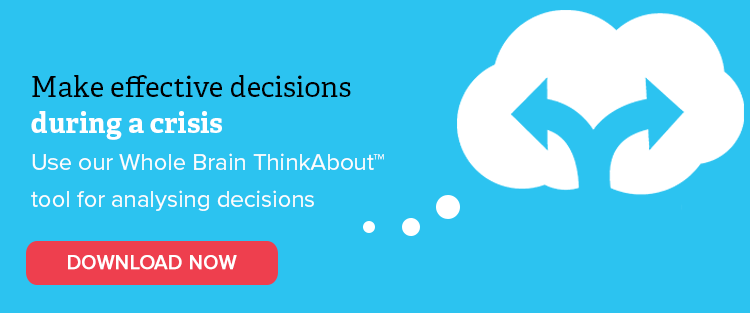Remote environments can be challenging to navigate under normal circumstances. Add in a global environment of stress and uncertainty, and those relationships and engagements can be even more difficult to manage.But they don’t have to be. Tapping into your team’s cognitive differences, and how those shift and/or show up during volatile times, can open the door to new opportunities and perspectives.Do you have that colleague that is predictable? You know, the one that always brings in a certain perspective? Perhaps they’re extremely vocal and extroverted during meetings. But since transitioning to a remote environment, that predictability seems to be more uncertain. They’re quiet, introspective and seem different. They’re bringing perspectives that you haven’t seen before — and it’s throwing you off your game.This is where understanding the cognitive shift we make under pressure becomes a critical factor in efficient teamwork. The team as you know it has shifted. For many of us, we may be entering uncharted territory. Taking a moment to identify your colleagues’ cognitive preferences — and how they shift under pressure — can be your greatest asset during times of change. Once the team is able to identify where each individual contributor is coming from and thinking from, both this shift and diversity become even more powerful.Team alignment is critical. Understanding, leveraging and enabling different mindsets and thinking preferences is the key to driving forward during uncertain times. Using the Whole Brain® Model as common ground to validate and encourage different perspectives and approaches to change is a key weapon during times of change. This post was a contribution from one of the Herrmann team based in the US, Jennifer Calvert, Sr. Manager, Client Success. This article was originally published on our US site. It has been updated and republished here to ensure our readers don’t miss out on valuable information.
This post was a contribution from one of the Herrmann team based in the US, Jennifer Calvert, Sr. Manager, Client Success. This article was originally published on our US site. It has been updated and republished here to ensure our readers don’t miss out on valuable information.
How? Remember the Basics
A-Quad (Analytical, Logical Thinking): Align on the goal. Identify primary objectives. Encourage those thinkers with a high blue preference to speak-up and contribute to the conversation around WHAT is needed.B-Quad (Safekeeping, Practical Thinking): Create a game plan. Allow room for some flexibility (your high D quadrant thinkers will thank you!), but ensure all team members know what they’re working towards and how to get there. Delegate a team lead with a high green preference to monitor the plan and be available to answer questions.C-Quad (Interpersonal, Feeling Thinking): Mobilise the team. Who is responsible for what? Has the impact on all stakeholders been taken into consideration? Does the goal and plan encourage empathy and understanding? Are we communicating to be understood? Your high red preference thinkers will be a critical resource in stepping into someone else’s shoes and sharing back internally. Delegate a high red preference thinker to be the primary communicator – gathering team perspectives and sharing back with the broader team.D-Quad (Innovative, Adventurous Thinking): Be open to the possibilities. Allowing the high yellow preference thinkers to brainstorm, whiteboard and think through all angles is more valuable than ever. As many teams look to maintain control, these thinkers will bring fresh perspectives that may not have been thought of yet. Allow time in or outside of meetings for these thinkers to contribute new ideas – and follow the process to put those ideas into practice.Tools to Leverage
Run a Team Effectiveness Dashboard. This allows the team to share, in an anonymised way, where they are and where they feel they need to be. Set up a time to facilitate a conversation (keeping in mind the recommended quadrants above) that identifies those gaps and think through how to address them. The Team Report is crucial! Understanding the process flow of the team – and the change under pressure – will enable the team to understand cognitive shifts and think through how to better work together as an inclusive, Whole Brain® team. And as always, we’re here to support you! The Herrmann team would love to give you more information on either of these and other tools you might find useful to help navigate the disruption you’re experiencing. Feel free to contact us to discuss this further. This post was a contribution from one of the Herrmann team based in the US, Jennifer Calvert, Sr. Manager, Client Success. This article was originally published on our US site. It has been updated and republished here to ensure our readers don’t miss out on valuable information.
This post was a contribution from one of the Herrmann team based in the US, Jennifer Calvert, Sr. Manager, Client Success. This article was originally published on our US site. It has been updated and republished here to ensure our readers don’t miss out on valuable information.
